Unit 4 Hobbies(复习课件)
文档属性
| 名称 | Unit 4 Hobbies(复习课件) | 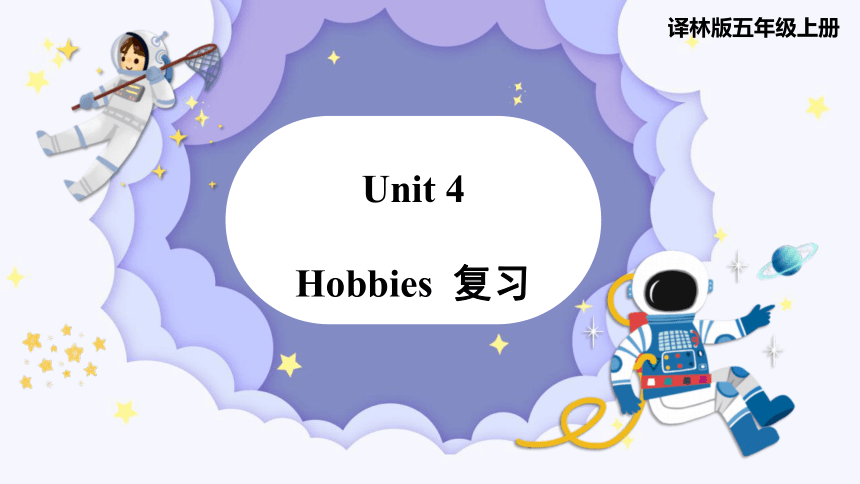 | |
| 格式 | pptx | ||
| 文件大小 | 6.9MB | ||
| 资源类型 | 试卷 | ||
| 版本资源 | 牛津译林版 | ||
| 科目 | 英语 | ||
| 更新时间 | 2023-10-19 09:59:39 | ||
图片预览



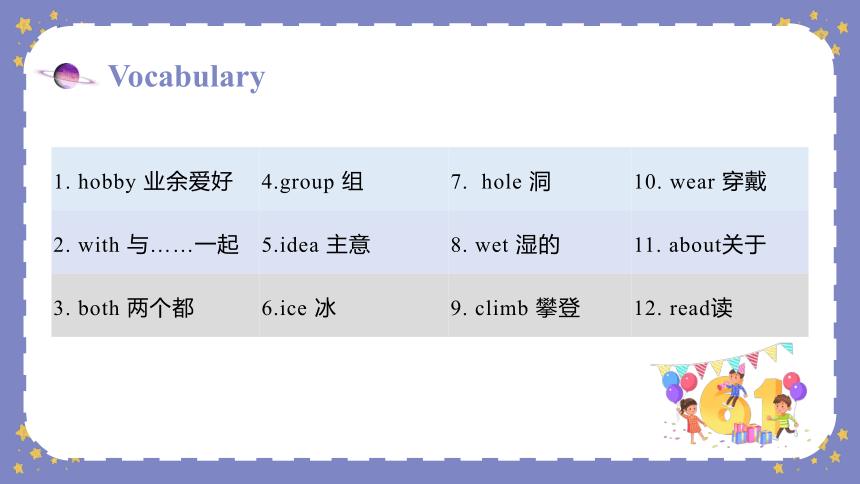
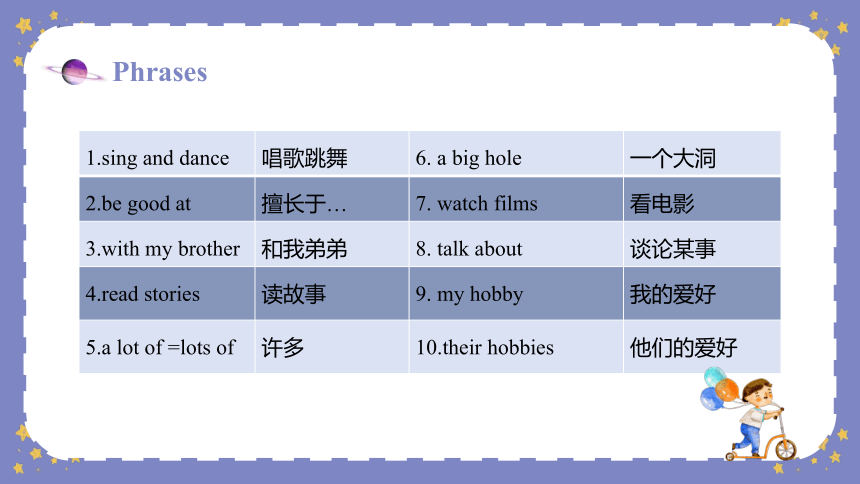
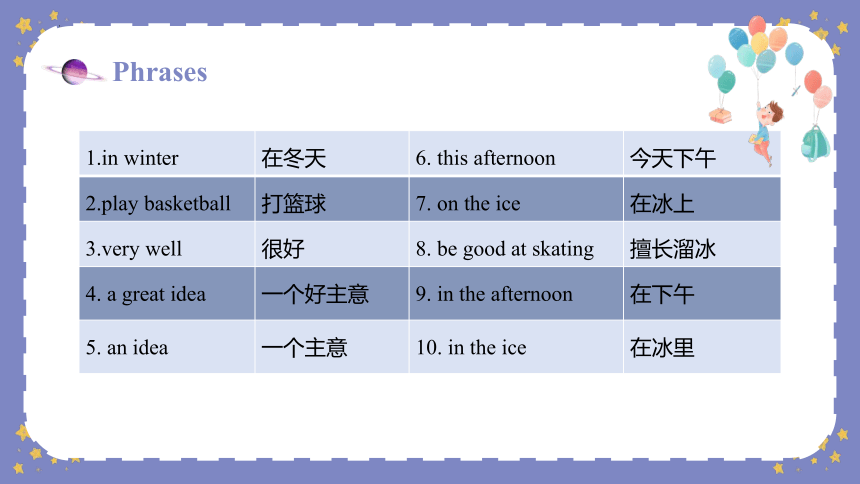
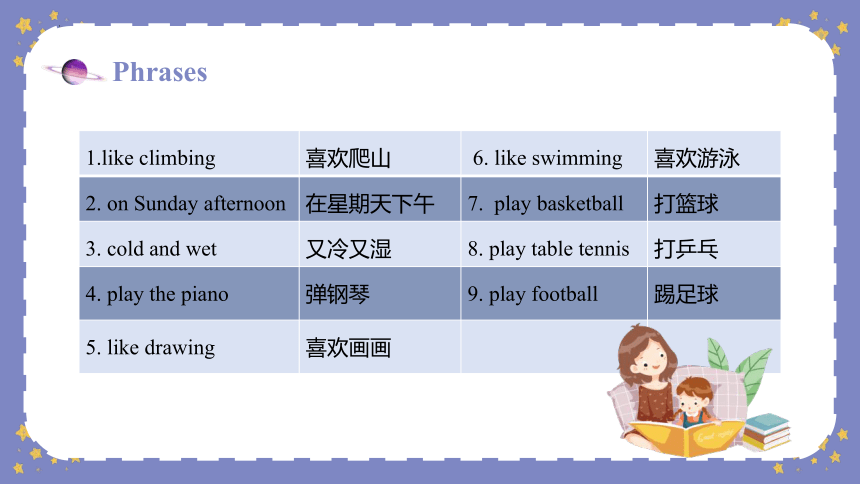
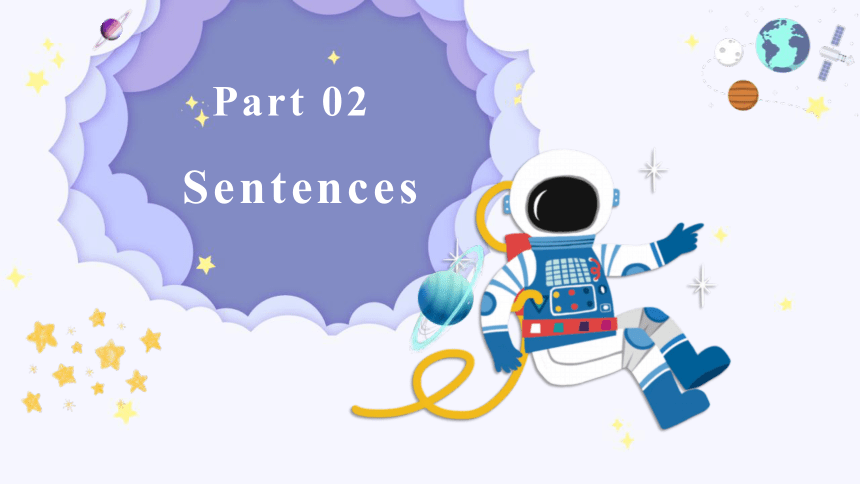
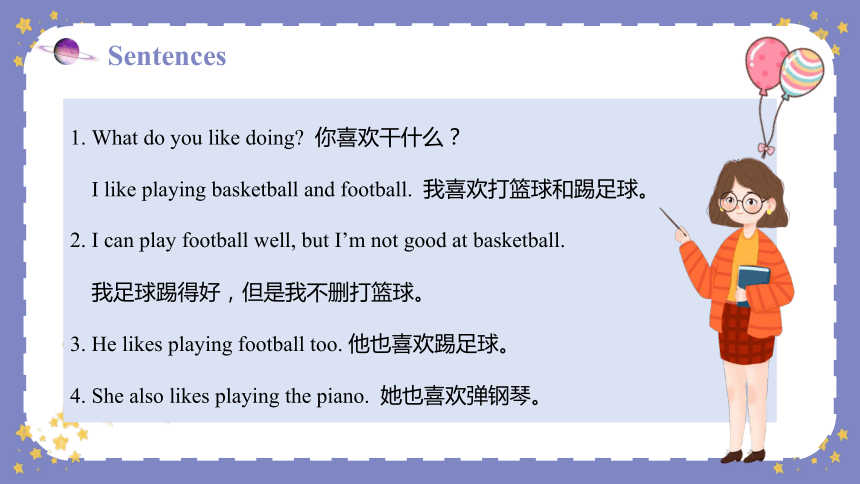
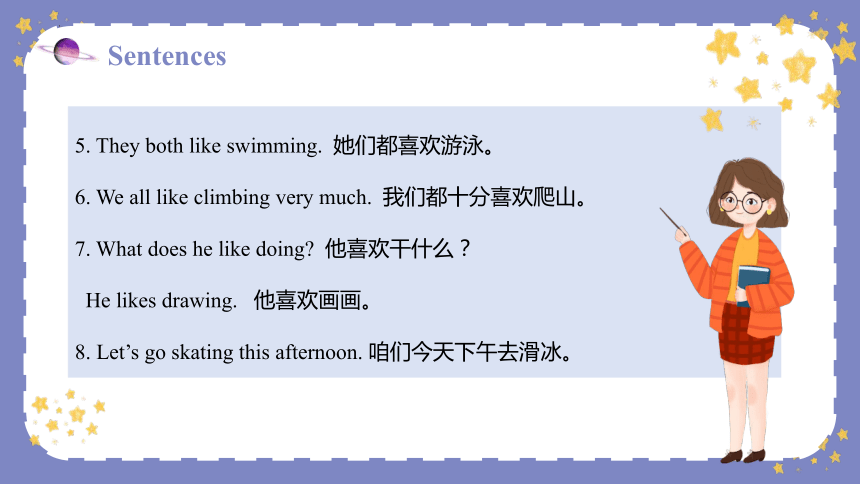
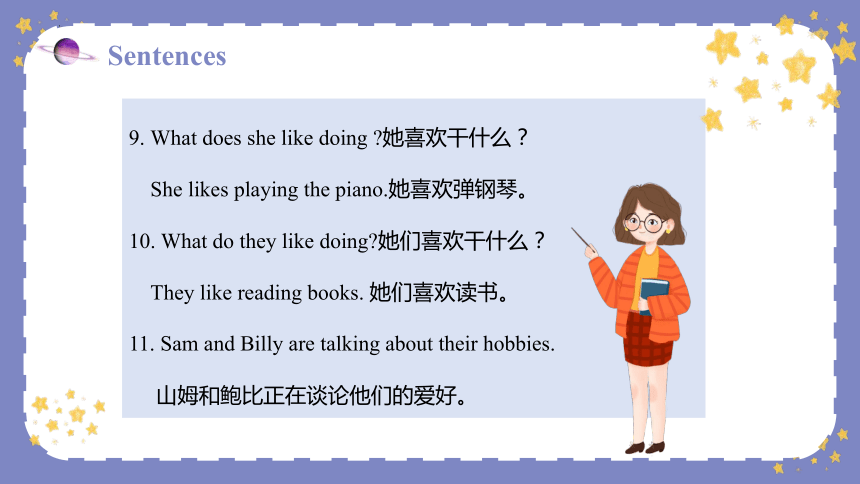
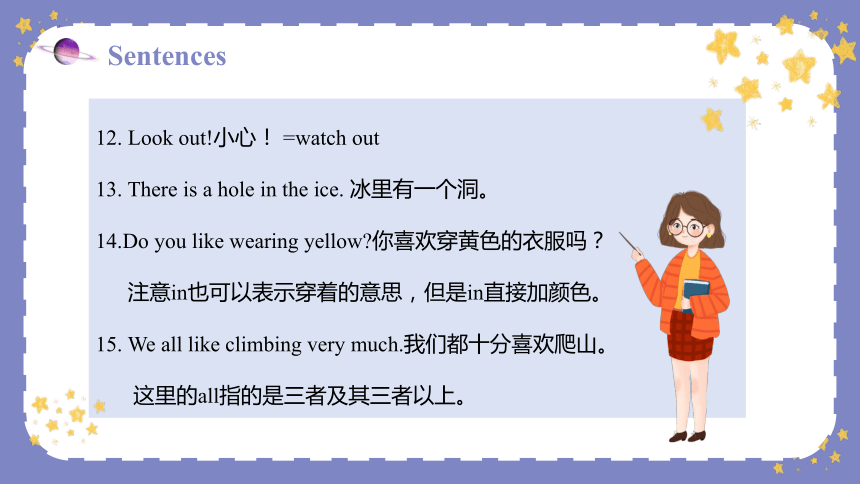
文档简介
(共36张PPT)
Unit 4
Hobbies 复习
译林版五年级上册
01
Vocabulary
02
Sentences
03
Grammar
Practice
目录 Directory
行业PPT模板http://www./hangye/
Vocabulary
Part 01
Vocabulary
1. hobby 业余爱好 4.group 组 7. hole 洞 10. wear 穿戴
2. with 与……一起 5.idea 主意 8. wet 湿的 11. about关于
3. both 两个都 6.ice 冰 9. climb 攀登 12. read读
Phrases
1.sing and dance 唱歌跳舞 6. a big hole 一个大洞
2.be good at 擅长于… 7. watch films 看电影
3.with my brother 和我弟弟 8. talk about 谈论某事
4.read stories 读故事 9. my hobby 我的爱好
5.a lot of =lots of 许多 10.their hobbies 他们的爱好
Phrases
1.in winter 在冬天 6. this afternoon 今天下午
2.play basketball 打篮球 7. on the ice 在冰上
3.very well 很好 8. be good at skating 擅长溜冰
4. a great idea 一个好主意 9. in the afternoon 在下午
5. an idea 一个主意 10. in the ice 在冰里
Phrases
1.like climbing 喜欢爬山 6. like swimming 喜欢游泳
2. on Sunday afternoon 在星期天下午 7. play basketball 打篮球
3. cold and wet 又冷又湿 8. play table tennis 打乒乓
4. play the piano 弹钢琴 9. play football 踢足球
5. like drawing 喜欢画画
Sentences
Part 02
Sentences
1. What do you like doing 你喜欢干什么?
I like playing basketball and football. 我喜欢打篮球和踢足球。
2. I can play football well, but I’m not good at basketball.
我足球踢得好,但是我不删打篮球。
3. He likes playing football too. 他也喜欢踢足球。
4. She also likes playing the piano. 她也喜欢弹钢琴。
Sentences
5. They both like swimming. 她们都喜欢游泳。
6. We all like climbing very much. 我们都十分喜欢爬山。
7. What does he like doing 他喜欢干什么?
He likes drawing. 他喜欢画画。
8. Let’s go skating this afternoon. 咱们今天下午去滑冰。
Sentences
9. What does she like doing 她喜欢干什么?
She likes playing the piano.她喜欢弹钢琴。
10. What do they like doing 她们喜欢干什么?
They like reading books. 她们喜欢读书。
11. Sam and Billy are talking about their hobbies.
山姆和鲍比正在谈论他们的爱好。
Sentences
12. Look out!小心! =watch out
13. There is a hole in the ice. 冰里有一个洞。
14.Do you like wearing yellow 你喜欢穿黄色的衣服吗?
注意in也可以表示穿着的意思,但是in直接加颜色。
15. We all like climbing very much.我们都十分喜欢爬山。
这里的all指的是三者及其三者以上。
Sound
Yy / j / year, yes, yellow, you, young
时间:202X年6月1日下午
地点:各班教室
主题:《 快乐六一班级秀》
选出画线部分发音与其余不同的单词。
( )1. A. year B.yellow C.family
( )2. A. put B.but C.sun
( )3. A. some B.mother C.box
( )4. A. usually B.under C.excuse
( )5. A. can B.doctor C.dance
Sound
C
A
C
B
C
Grammar
Part 03
Grammar
like的用法
用法口诀: like一词用法多,后加名词要注意,可数名词用复数,不可数名词直接加,碰上动词加ing,前有would后加to, 别忘动词用原形。
Grammar
【区分】like doing & would like to do
(1)like+可数名词复数,表示“喜欢某一类东西”。
I like cakes very much. 我非常喜欢蛋糕。
(2)like+不可数名词,表示“喜欢某一类东西”。如:
I like apple juice.我喜欢苹果汁。
Grammar
【区分】like doing & would like to do
(3)like+动词-ing(动名词),表示“喜欢做某事”。如:
I like reading books in the evening.我喜欢在夜晚看书。
(4)would like to do sth 表示 “想要做某事”。 如:
I’d like to have something to eat. 我想要一些吃的。
like doing sth 和like to do 区别:
like doing sth 强调“一直”喜欢做某事,
如:I like swimming. like to do sth 强调“某一段时间或某一次”喜欢做某事,
如:I like to read this evening.
Grammar
动名词(动词ing形式)的变化规则(1)一般在动词末尾加ing, 如:
think → thinking stand → standing(2)以不发音字母e结尾的动词,先去掉e,再加ing,如
skate → skating make → making dance → dancing
write → writing have → having ride → riding come → coming
Grammar
动名词(动词ing形式)的变化规则(3)以重读闭音节结尾的动词,末尾只有一个元音字母(闭音节),以及一个辅音字母,应双写末尾的辅音字母,再加ing, 如:
put →putting run-running sit → sitting swim → swimming get → getting
Grammar
询问某人喜欢干什么,句型:What do/ does...like doing
(1)主语为非三单(第一人称,第二人称及第三人称复数)时,用助动词do。如:What do you/ they like doing 你/你们/他们喜欢干什么?I/We/You/They like ... 我/我们/你/你们/他们喜欢……
Grammar
询问某人喜欢干什么,句型:What do/ does...like doing
(2) 主语为第三人称单数时,借助于does。如:What does he/ she/ it/ Tom like doing 他/她/它/汤姆喜欢干什么?He/ She/ It likes... 他/她/它喜欢……例句:她喜欢做什么?What does she like doing 她喜欢读书。She likes reading.
Grammar
一般现在时的构成:
一般现在时肯定式的构成,应注意不同人称be动词或实义动词的正确使用。如下表:
Grammar
实义动词 be 动词
I like it. I am a student.
You like it. You are a student.
He/ She likes it. He/ She is a student.
We / You / They like it. We / You / They are students.
(注意,当主语为第三人称单数时,动词也要变为第三人称单数。)
Grammar
动词第三人称单数构成方法:
类别 构成方法 例词
一般情况 在动词后加s like-likes;read-reads
以s,x,sh,ch,部分o结尾 加es watch- watches;fish-fishes
以辅音字母+y结尾 变y为i加es study-studies;carry-carries
以元音字母+y结尾 在动词后加s say-says;play-plays
巧学妙记: 一般情况词尾“-s”加; o, s, x , sh, ch 结尾“-es”不能差;辅音加y,变y为i,再把“-es”来加; 多读多练牢记它。
Grammar
动词后加ing形式的情况有:(1)like后,表示“喜欢做某事”,如: I like skating.(2)go后,表示“去做某事”,如: Let’s go skating this afternoon. (3)no后,表示“禁止做某事”,如: “No skating.”禁止滑冰。(4)be后,表示“正在做某事”,如: Look, she is skating. 看,她正在滑冰。(3)介词后,介词后必须用动名词,如: You’re really good at skating.
also 一般用于句中,too 一般用于句尾。
both表示“两人都”,all表示“三人及三人以上都”
Grammar
情态动词can的用法:
(1)can表示具有某种能力,有“能、会”的意思;
e.g. 鸟会飞。(翻译) ______________________________
(2)表示客观的可能性,有“能,可能”的意思;
e.g. 这可能是真的。 _______________________________
Grammar
情态动词can的用法:
(3)在口语中可以用may代替,表示“许可,可以”;
e.g. 我可以帮你吗? ______________________________
can的否定形式是:___________,可以缩写为:__________。
Grammar
with 介词,__________
【同义词】_____________
【反义词】_____________
【with和and的区别】
with是介词,可以理解为是补充的部分,解题时要忽略它;而and是连词,连接的两个东西是平等的。
【练习】用be动词的正确形式填空
①Tom with his mother _______(be) in the park.
②Tom and his mother _______(be) in the park.
Grammar
well与good的区别:
well 副词,修饰动词 eg: I can play basketball well.
表身体状况时做形容词 eg: I feel well today.
good 形容词,修饰名词 eg: He is a good player.
Grammar
a lot of __________
a lot of 与lots of 同义,既可修饰可数名词,又可修饰不可数名词。
修饰可数名词时,相当于__________;修饰不可数名词时,相当于__________。
e.g.:地上有很多水。 There is __________ __________ on the floor.
=__________________________________________________.
Grammar
名词 eg: I am good at English.
擅长… be good at
doing sth eg: I am good at swimming.
Grammar
写作指导
第一步:介绍兴趣爱好:
I have many hobbies./... is my hobby./ Do you like...
第二步:介绍爱好:
I like...
第三步:介绍爱好的原因:
I can .../I am good at...I have.../ I usually...
第四步:反问他人爱好: What about you Do you like...
What are your hobbies
线下活动
描述兴趣爱好:介绍你自己、家人或朋友以及各自的爱好吧。要求语句通顺,语法正确,不少于50词。题目自拟。 Our Hobbies I like playing table tennis and drawing. I can draw well, but I am not good at playing table tennis. I like swimming too. I usually swim in the river with my sister Lucy. This is my friend Lily. She also likes drawing. She often goes to the park and draws in it.She is good at it.
Thank you !
Unit 4
Hobbies 复习
译林版五年级上册
01
Vocabulary
02
Sentences
03
Grammar
Practice
目录 Directory
行业PPT模板http://www./hangye/
Vocabulary
Part 01
Vocabulary
1. hobby 业余爱好 4.group 组 7. hole 洞 10. wear 穿戴
2. with 与……一起 5.idea 主意 8. wet 湿的 11. about关于
3. both 两个都 6.ice 冰 9. climb 攀登 12. read读
Phrases
1.sing and dance 唱歌跳舞 6. a big hole 一个大洞
2.be good at 擅长于… 7. watch films 看电影
3.with my brother 和我弟弟 8. talk about 谈论某事
4.read stories 读故事 9. my hobby 我的爱好
5.a lot of =lots of 许多 10.their hobbies 他们的爱好
Phrases
1.in winter 在冬天 6. this afternoon 今天下午
2.play basketball 打篮球 7. on the ice 在冰上
3.very well 很好 8. be good at skating 擅长溜冰
4. a great idea 一个好主意 9. in the afternoon 在下午
5. an idea 一个主意 10. in the ice 在冰里
Phrases
1.like climbing 喜欢爬山 6. like swimming 喜欢游泳
2. on Sunday afternoon 在星期天下午 7. play basketball 打篮球
3. cold and wet 又冷又湿 8. play table tennis 打乒乓
4. play the piano 弹钢琴 9. play football 踢足球
5. like drawing 喜欢画画
Sentences
Part 02
Sentences
1. What do you like doing 你喜欢干什么?
I like playing basketball and football. 我喜欢打篮球和踢足球。
2. I can play football well, but I’m not good at basketball.
我足球踢得好,但是我不删打篮球。
3. He likes playing football too. 他也喜欢踢足球。
4. She also likes playing the piano. 她也喜欢弹钢琴。
Sentences
5. They both like swimming. 她们都喜欢游泳。
6. We all like climbing very much. 我们都十分喜欢爬山。
7. What does he like doing 他喜欢干什么?
He likes drawing. 他喜欢画画。
8. Let’s go skating this afternoon. 咱们今天下午去滑冰。
Sentences
9. What does she like doing 她喜欢干什么?
She likes playing the piano.她喜欢弹钢琴。
10. What do they like doing 她们喜欢干什么?
They like reading books. 她们喜欢读书。
11. Sam and Billy are talking about their hobbies.
山姆和鲍比正在谈论他们的爱好。
Sentences
12. Look out!小心! =watch out
13. There is a hole in the ice. 冰里有一个洞。
14.Do you like wearing yellow 你喜欢穿黄色的衣服吗?
注意in也可以表示穿着的意思,但是in直接加颜色。
15. We all like climbing very much.我们都十分喜欢爬山。
这里的all指的是三者及其三者以上。
Sound
Yy / j / year, yes, yellow, you, young
时间:202X年6月1日下午
地点:各班教室
主题:《 快乐六一班级秀》
选出画线部分发音与其余不同的单词。
( )1. A. year B.yellow C.family
( )2. A. put B.but C.sun
( )3. A. some B.mother C.box
( )4. A. usually B.under C.excuse
( )5. A. can B.doctor C.dance
Sound
C
A
C
B
C
Grammar
Part 03
Grammar
like的用法
用法口诀: like一词用法多,后加名词要注意,可数名词用复数,不可数名词直接加,碰上动词加ing,前有would后加to, 别忘动词用原形。
Grammar
【区分】like doing & would like to do
(1)like+可数名词复数,表示“喜欢某一类东西”。
I like cakes very much. 我非常喜欢蛋糕。
(2)like+不可数名词,表示“喜欢某一类东西”。如:
I like apple juice.我喜欢苹果汁。
Grammar
【区分】like doing & would like to do
(3)like+动词-ing(动名词),表示“喜欢做某事”。如:
I like reading books in the evening.我喜欢在夜晚看书。
(4)would like to do sth 表示 “想要做某事”。 如:
I’d like to have something to eat. 我想要一些吃的。
like doing sth 和like to do 区别:
like doing sth 强调“一直”喜欢做某事,
如:I like swimming. like to do sth 强调“某一段时间或某一次”喜欢做某事,
如:I like to read this evening.
Grammar
动名词(动词ing形式)的变化规则(1)一般在动词末尾加ing, 如:
think → thinking stand → standing(2)以不发音字母e结尾的动词,先去掉e,再加ing,如
skate → skating make → making dance → dancing
write → writing have → having ride → riding come → coming
Grammar
动名词(动词ing形式)的变化规则(3)以重读闭音节结尾的动词,末尾只有一个元音字母(闭音节),以及一个辅音字母,应双写末尾的辅音字母,再加ing, 如:
put →putting run-running sit → sitting swim → swimming get → getting
Grammar
询问某人喜欢干什么,句型:What do/ does...like doing
(1)主语为非三单(第一人称,第二人称及第三人称复数)时,用助动词do。如:What do you/ they like doing 你/你们/他们喜欢干什么?I/We/You/They like ... 我/我们/你/你们/他们喜欢……
Grammar
询问某人喜欢干什么,句型:What do/ does...like doing
(2) 主语为第三人称单数时,借助于does。如:What does he/ she/ it/ Tom like doing 他/她/它/汤姆喜欢干什么?He/ She/ It likes... 他/她/它喜欢……例句:她喜欢做什么?What does she like doing 她喜欢读书。She likes reading.
Grammar
一般现在时的构成:
一般现在时肯定式的构成,应注意不同人称be动词或实义动词的正确使用。如下表:
Grammar
实义动词 be 动词
I like it. I am a student.
You like it. You are a student.
He/ She likes it. He/ She is a student.
We / You / They like it. We / You / They are students.
(注意,当主语为第三人称单数时,动词也要变为第三人称单数。)
Grammar
动词第三人称单数构成方法:
类别 构成方法 例词
一般情况 在动词后加s like-likes;read-reads
以s,x,sh,ch,部分o结尾 加es watch- watches;fish-fishes
以辅音字母+y结尾 变y为i加es study-studies;carry-carries
以元音字母+y结尾 在动词后加s say-says;play-plays
巧学妙记: 一般情况词尾“-s”加; o, s, x , sh, ch 结尾“-es”不能差;辅音加y,变y为i,再把“-es”来加; 多读多练牢记它。
Grammar
动词后加ing形式的情况有:(1)like后,表示“喜欢做某事”,如: I like skating.(2)go后,表示“去做某事”,如: Let’s go skating this afternoon. (3)no后,表示“禁止做某事”,如: “No skating.”禁止滑冰。(4)be后,表示“正在做某事”,如: Look, she is skating. 看,她正在滑冰。(3)介词后,介词后必须用动名词,如: You’re really good at skating.
also 一般用于句中,too 一般用于句尾。
both表示“两人都”,all表示“三人及三人以上都”
Grammar
情态动词can的用法:
(1)can表示具有某种能力,有“能、会”的意思;
e.g. 鸟会飞。(翻译) ______________________________
(2)表示客观的可能性,有“能,可能”的意思;
e.g. 这可能是真的。 _______________________________
Grammar
情态动词can的用法:
(3)在口语中可以用may代替,表示“许可,可以”;
e.g. 我可以帮你吗? ______________________________
can的否定形式是:___________,可以缩写为:__________。
Grammar
with 介词,__________
【同义词】_____________
【反义词】_____________
【with和and的区别】
with是介词,可以理解为是补充的部分,解题时要忽略它;而and是连词,连接的两个东西是平等的。
【练习】用be动词的正确形式填空
①Tom with his mother _______(be) in the park.
②Tom and his mother _______(be) in the park.
Grammar
well与good的区别:
well 副词,修饰动词 eg: I can play basketball well.
表身体状况时做形容词 eg: I feel well today.
good 形容词,修饰名词 eg: He is a good player.
Grammar
a lot of __________
a lot of 与lots of 同义,既可修饰可数名词,又可修饰不可数名词。
修饰可数名词时,相当于__________;修饰不可数名词时,相当于__________。
e.g.:地上有很多水。 There is __________ __________ on the floor.
=__________________________________________________.
Grammar
名词 eg: I am good at English.
擅长… be good at
doing sth eg: I am good at swimming.
Grammar
写作指导
第一步:介绍兴趣爱好:
I have many hobbies./... is my hobby./ Do you like...
第二步:介绍爱好:
I like...
第三步:介绍爱好的原因:
I can .../I am good at...I have.../ I usually...
第四步:反问他人爱好: What about you Do you like...
What are your hobbies
线下活动
描述兴趣爱好:介绍你自己、家人或朋友以及各自的爱好吧。要求语句通顺,语法正确,不少于50词。题目自拟。 Our Hobbies I like playing table tennis and drawing. I can draw well, but I am not good at playing table tennis. I like swimming too. I usually swim in the river with my sister Lucy. This is my friend Lily. She also likes drawing. She often goes to the park and draws in it.She is good at it.
Thank you !
